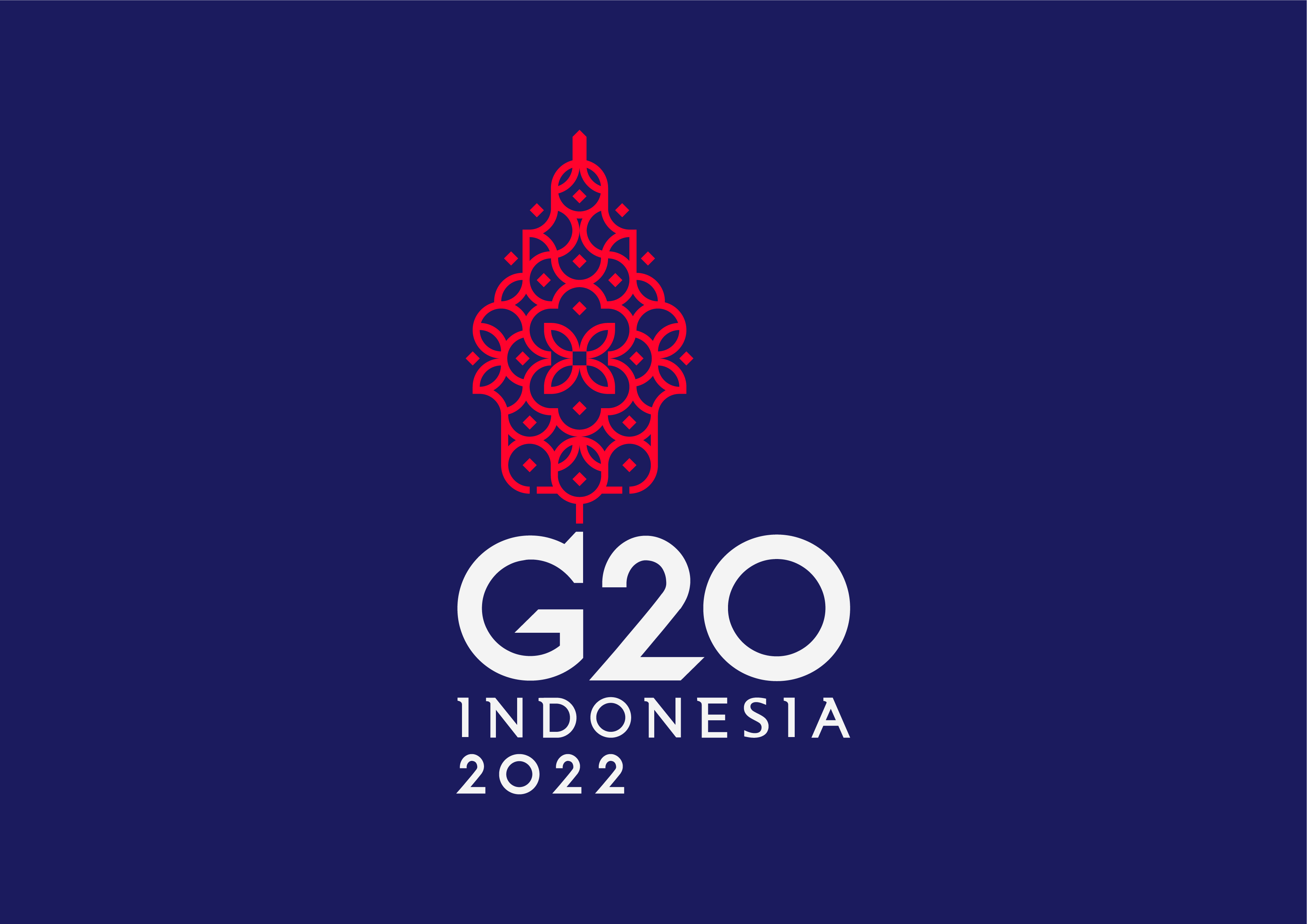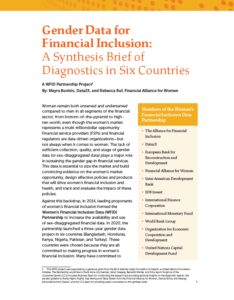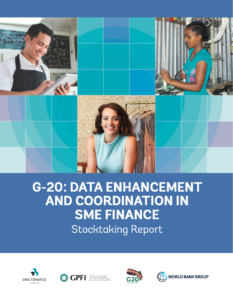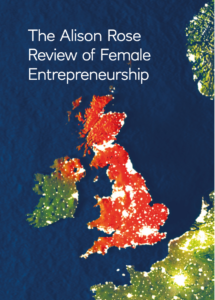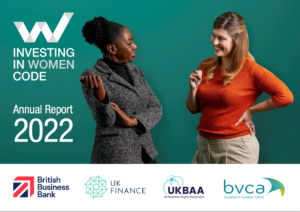GPFI Workshop: New Approaches to Closing Finance & Data Gaps for Women-led Businesses
Date: July 21, 2022
Time: 6:00 am – 8:30 am EST | 5:00 pm – 7:30 pm Jakarta
Access to finance has always been a significant constraint for women entrepreneurs, hindering their growth prospects. Lack of SME data on a sex-disaggregated basis has made it difficult to close the $1.7 trillion gap in financing facing 400 million women-owned businesses globally.
A GPFI Workshop on New Approaches to Closing Finance & Data Gaps for Women-Led Businesses was held on July 21, 2022. The event focused on discussing models, including providing input into the new global WE Finance Code, that can be applied to take GPFI recommendations on sex-disaggregated data into action. Co-sponsors of the event included the SME Finance Forum, the Women Entrepreneurs Finance Initiative (We-Fi), the International Finance Corporation (IFC), the Asian Development Bank (ADB), the Financial Alliance for Women (FAW), Women20 (W20), the Organization for Economic Cooperation and Development (OECD) and Data2X.
Doni P. Joewono, Deputy Governor of Bank Indonesia, opened the workshop noting the importance of a data-driven approach to close the gender gap, especially for MSMEs access to finance. He noted that collecting sex-disaggregated data to formulate policy initiatives is critical to implementing Indonesia’s National Strategy for Financial Inclusion.
In her opening remarks, Magda Bianco, Co-Chair of GPFI, welcomed the opportunity to learn about models that are contributing to fill existing MSME data gaps and how they may be scaled across countries to encourage data harmonization, a priority for GPFI.
“These models can lead to real change in behaviors of relevant actors by learning from best practices”.
Matt Gamser, CEO of the SME Finance Forum was the MC for the event and also commented on the importance of this issue for the data harmonization work of GPFI. He also noted the importance of working across the ecosystem and the intractable nature of these challenges.
Three models for collecting sex-disaggregated data were presented:
Francis Evans, Head of Business Finance, UK Business Growth Directorate, presented The UK Investing in Women Code, a strong partnership between financial institutions, trade associations and government that has led over 160 UK financial institutions to start tracking and reporting MSME data on a sex-disaggregated basis. Francis highlighted two success factors of the UK Code, which is the model for the global WE Finance Code: (1) it is a substantial commitment to action by financial institutions that is achievable, and (2) the need for long-term commitment to gain wide support among banks and to build data collection capabilities. He also noted the flexibility of the model to be adopted to different local situations. For example, implementation does not have to take a national approach with government leadership, and regulators can collect data directly. In addition, accountability and broad-scale adoption in a country may be created through a mandatory vs. voluntary approach. The Code was launched in the UK as a result of the Rose Review of Female Entrepreneurship, now in its third year.
Celine Kauffmann, Head of Entrepreneurship, SMEs & Tourism Division at the OECD, shared the challenges of collecting sex-disaggregated date for SMEs based on the OECD Scoreboard. While the scoreboard provides information on aggregate SME financing trends and policies for 48 countries around the world from 2007 through 2021, they have faced challenges collecting sex-disaggregated data,
“On the supply side, commercial banks are not asked to report sex-disaggregated data by regulators. On the demand side, data is mostly collected through surveys, which are not comparable due to lack of data harmonization.”
Wendy Teleki, Head of the We-Fi Secretariat, introduced the WE Finance Code, a proposed global framework to systematically address data gaps in financing and supporting women entrepreneurs. Similar to the UK, the Code would ask signatories to pledge to three actions, including reporting on an aggregate basis a finite number of sex-disaggregated indicators related to financing women-led firms. An annual report would enable benchmarking and data-driven actions by the financial ecosystem to increase access to finance for women entrepreneurs. A multi-stakeholder approach, including support from MDBs, DFIs and ecosystem players, would create reenforcing mechanism with incentives and accountability to achieve impact. To encourage global adoption by as many financial institutions as possible, the Code would provide a framework that can be adopted to local needs. Financial institutions would be able to sign up to the global Code, but national efforts would be encouraged wherever possible. Such efforts will be implemented by local champions, including national actors facilitating industry-wide participation. The Code is being developed through consultation with a broad set of stakeholders, and Wendy invited participants to reach out to get involved.
A panel on ongoing country initiatives in Nigeria, Honduras and the Netherlands from a public sector perspective was moderated by Rebecca Ruff, EVP, Financial Alliance for Women. To set the context, Rebecca shared the key learnings from FAW’s recent diagnostics in six countries regarding gender-disaggregated data, which they learned catalyzes action by the financial ecosystem. Given the lack of SME disaggregated data and the successful examples that leveraged a formal structure, like the framework the Code would provide, she sees “huge opportunity for a global WE Finance Code.”
The panelists’ experiences of these countries spotlighted the leading role the public sector can play in collecting sex-disaggregated data, but reinforced the challenge of doing so for SMEs.
“Sex-disaggregated data is being reported in Honduras since 2019 for individuals but not SMEs”,
said Alba Luz Valladares, Chief Commissioner of the National Commission of Banks and Insurance Companies of Honduras. Jaap Jansen from the Central Bureau of Statistics, Netherlands, emphasized the importance of collecting supply side and demand side data to understand the gap and needs of women entrepreneurs regarding access to finance. While policymakers actively use the data, common challenges include getting buy-in and enabling financial intermediaries to collect and use the data internally due to lack of understanding of the business case and manual processes. Panelists expressed interest in a global framework like the WE Finance Code to create a reinforcing mechanism with accountability that aligns the private and public sectors around shared goals and enables coordination of activities. “The Code would create a moral obligation by signatories to act”, said Dr. Paul Oluikpe, Head of Financial Inclusion, Central Bank of Nigeria, to indicate the value add of a global Code in case of a mandatory reporting model. Differences between models used by these countries highlighted the flexibility needed to adapt a global framework to meet local needs.
A second panel featuring UK Finance, Citi Social Finance and Development Bank of Nigeria focused on the practical considerations for tracking sex-disaggregated data. The panelists raised three areas where a global Code could help to advance their efforts in sex-disaggregated data collection: Jennifer Tankard from UK Finance emphasized the need to create trusted partnership between public and private sector, and more standardized definitions of women-led MSMEs. Borja Garcia Fernandez from Citi Social Finance called for supporting financial service providers with building the infrastructure for data collection. Jennifer also shared the banking association’s role as the data collector for the UK Investing in Women Code using templates and tools, and leveraging multiple data sources to contextualize the data. She highlighted the importance of the UK’s annual report, which helps to signal commitment by the financial sector and create transparency while enabling benchmarking and best practice sharing through case studies.
The final panel focused on the value multi-lateral development banks and other ecosystem players can add to closing the data gap.
“Bringing in the Code would be the first step in collecting data and building the argument for gender financing”,
said Christine Engstrom, Director for Private Sector Financial Institutions at ADB. Jessica Schnabel, Global Head of Banking on Women at IFC, believes MDBs can incentivize financial intermediaries through gender financing and technical assistance. She shared Borja’s concern that operational challenges deter banks from flagging WSMEs in their portfolio, which in turn prevents them from seeing the business case for WSME lending and using “the power of sex-disaggregated data for strategic business decision making and public sector policy making”. Mahesh Uttamchandani, Practice Manager of the Finance, Competitiveness & Innovation Global Practice at the World Bank, sees an important role for regulators, including from a compliance perspective to achieve impact at scale. However, this will require organizations like the World Bank to continue to strengthen and share the business case for investing in women entrepreneurs to make the case for prioritizing them in national inclusion strategies. In this exercise, he pointed out the big opportunity in going beyond the traditional financial services providers and working with FinTechs who have stronger digital capabilities to collect and analyze sex-disaggregated data on their clients. Esselina Macome, Chief Executive Officer of FSD Mozambique, agreed that regional organizations like FSD can play a catalyzing role in championing the Code in Africa. Finally, Jessica Espinoza, Chief Executive Officer of the 2XCollaborative, hopes the Code can not only build on existing initiatives but connect the gaps between individual institutional and national and regional level databases to enable systemic analysis and peer to peer learning and collaboration across the ecosystem in a country.
Wempi Saputra, Assistant of Minister for Macro Economy and International Finance, Ministry of Finance, Indonesia, thanked participants for their active engagement in the workshop and ongoing support to improve availability to sex-disaggregated data on access to finance for MSMEs, including through the WE Finance Code.
In closing, Wendy Teleki invited participants to reach out to participate in the consultative process during the planning phase of the WE Finance Code, which is planned to launch with country pilots in Spring of 2023.
Welcoming Remarks
-
Doni P. Joewono, Deputy Governor of Bank Indonesia
Opening Remarks
-
Magda Bianco, Co-Chair, GPFI
-
Matt Gamser, CEO, SME Finance Forum
Overview of challenges & solutions: National-level models for collecting sex-disaggregated data
-
Francis Evans, Head of Business Finance, UK Business Growth Directorate – Investing in Women Code
-
Celine Kauffmann, Head, Entrepreneurship, SMEs & Tourism Division, OECD
-
Wendy Teleki, Head of We-Fi Secretariat – WE Finance Code
Panel discussion: Perspectives from countries
-
Moderator: Rebecca Ruf, Executive Vice President, Financial Alliance for Women
-
Oktorialdi Ilyas, Ph.D, Expert Staff for Indonesia Minister of National Development Planning on Equity and Regional Development, Ministry of National Development Planning Republic of Indonesia
-
Alba Luz Valladares, Chief Commissioner of the National Commission of Banks and Insurance Companies of Honduras
-
Dr. Paul Oluikpe, Head of Financial Inclusion, Central Bank of Nigeria
-
Jaap Jansen, Central Bureau of Statistics, Netherlands
Panel discussion: Practical Considerations for Tracking Sex-Disaggregated Data
-
Moderator: Matt Gamser, CEO, SME Finance Forum
-
Jennifer Tankard, Principal, Commercial Finance, UK Finance – Banking Association
-
Borja Garcia Fernandez, Head, Structuring, Citi Social Finance
-
Theresa Lawal, Head of Product Development and strategic alliances, Development Bank of Nigeria
Panel discussion: Challenges & Opportunities from an Ecosystem Perspective
-
Moderator: Wendy Teleki, Head of We-Fi Secretariat
-
Christine Engstrom, Director, Private Sector Financial Institutions, ADB
-
Jessica Schnabel, Global Head, Banking on Women, IFC
-
Mahesh Uttamchandani, Practice Manager, Finance, Competitiveness & Innovation Global Practice, World Bank
-
Esselina Macome, Chief Executive Officer, FSD Mozambique
-
Jessica Espinoza, Chief Executive Officer, 2XCollaborative
Closing Remarks
-
Wempi Saputra, Advisor for Minister of Finance Indonesia on Macro Economy and International Finance, Ministry of Finance, Indonesia.
-
Matt Gamser, CEO, SME Finance Forum
Financial Alliance for Women: Diagnostics on Gender Data for Financial Inclusion in Bangladesh, Honduras, Kenya, Nigeria, Pakistan, and Turkey
G20: Data Enhancement and Coordination in SME Finance
Alison Rose Review of Female Entrepreneurship
